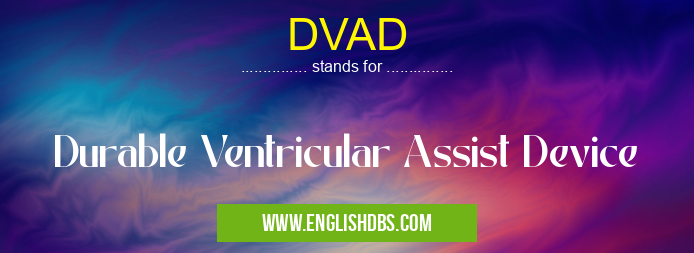What does DVAD mean in CARDIOLOGY
A Durable Ventricular Assist Device (DVAD) is a device designed to help support your heart if it is not working well. It can be used to provide long-term assistance if you are suffering from severe heart failure or other diseases that affect your heart's ability to pump blood effectively. DVADs are typically implanted in the chest and connected directly to the left ventricle of the heart, helping to take over the pumping function when necessary.

DVAD meaning in Cardiology in Medical
DVAD mostly used in an acronym Cardiology in Category Medical that means Durable Ventricular Assist Device
Shorthand: DVAD,
Full Form: Durable Ventricular Assist Device
For more information of "Durable Ventricular Assist Device", see the section below.
» Medical » Cardiology
Essential Questions and Answers on Durable Ventricular Assist Device in "MEDICAL»CARDIOLOGY"
What does a DVAD do?
A Durable Ventricular Assist Device (DVAD) is a device designed to help support your heart if it is not working well. It takes over the pumping function of the heart when needed, helping to improve blood flow and circulation throughout the body.
Who might need a DVAD?
People who suffer from severe cases of congestive heart failure or other diseases that affect the ability of their hearts to pump blood effectively may be prescribed a DVAD by their doctor as a form of long-term treatment or prevention.
How is a DVAD implanted?
The device is usually attached directly to the left ventricle using minimally invasive surgery, and then connected just underneath the chest skin with an incision through which wires run into the heart itself.
What kind of care is needed after getting a DVAD?
After getting a DVAD, regular monitoring visits will be needed with your healthcare provider so that any problems can be detected early on and treated promptly. Additionally, anticoagulants such as aspirin or warfarin might need to be taken regularly in order to prevent blood clots from forming around the device.
What are some possible risks associated with using a DVAD?
Some possible risks associated with using a DVAD include infection at the implant site, stroke and bleeding due to anticoagulant medication use, gastrointestinal bleeding, and device malfunction requiring immediate medical attention.
Final Words:
A Durable Ventricular Assist Device (DVAD) can provide support for people suffering from serious heart conditions, helping them maintain better circulation throughout their bodies despite their weakened cardiac muscles. However, it is important for patients undergoing this type of treatment to understand all associated risks and potential complications so they can remain aware of their own health status. With proper monitoring and care, many people have found success with this type of therapy over time.
